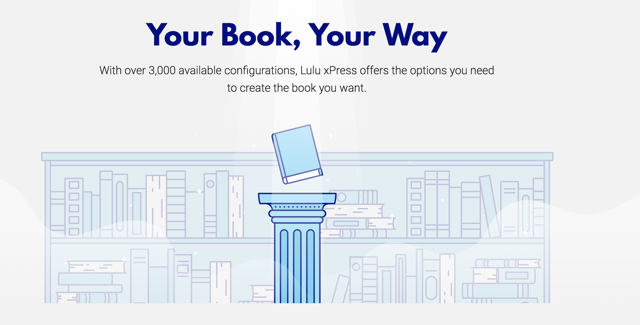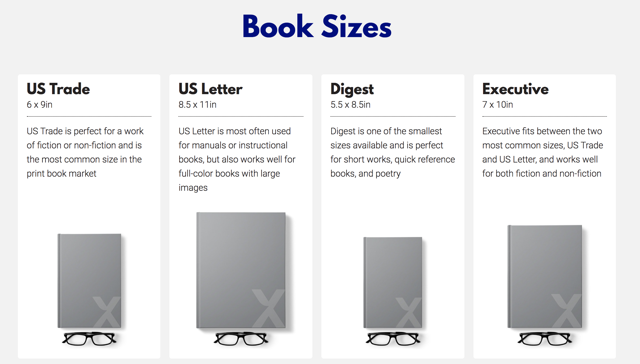
Our friends over at Lulu told us about a really great system that helps writers sell their books directly from their websites to their readers with Shopify. We thought that this sounded like great information for authors interested in self-publishing options, so we asked our friend Paul from Lulu to write up a guest post explaining how it works.
We hope you find it informative as you pursue your self-publishing journey!
Self-Publishing and eCommerce: a Better Way to Sell Your Books
How do you sell your books? Amazon? Barnes & Noble’s online store? By hand from a box in the backseat of your car?
How do you feel about your sales? Making some decent money? Making some indecent money? Not making money at all?
Does it seem like something is just not quite clicking in your marketing plan?
Alright, no more questions.
Look, selling your book on retail sites like Amazon is a good idea. I’m not going to try to tell you not to list your book on Amazon. I mean, the chances of someone coming to Amazon to buy your book and leaving with an Ambient Narwhal Nightlight instead is slim, but still... do you really want to rely on the world’s biggest and most diverse retailer as your primary outlet for sales?
Wait... Sorry. I guess there are more questions.
What I’m getting at is this: you shouldn’t expect a behemoth retailer like Amazon to do anything more than list your book and take a slice (a big one) of your profits if you make a sale. Amazon doesn't actually care all that much about your individual book; they are simply selling products. Yours is just one among many.

The Times They Are Changing
The modern web is a diverse communications tool. Thanks to a huge range of open source technology and design, along with the growth in Semantic Web practices, anyone can easily maintain a strong web presence. The need to lean on retailers as a sales medium is shrinking. Fast.
Savvy creators use social media and online communities to build a following. Your readers can come from all over the world because the world is all connected!
If you’re putting tons of effort into courting and capturing followers on social media, forums, and through your own website or blog, you shouldn't then drive your followers to a third party to buy your book!
Imagine going to see your favorite band at a local venue. You’re pumped to see them perform live. You want to contribute and support them and to enjoy the experience with a memento, so you go in search of the merch booth. What you find instead is instructions to go to a store somewhere else and buy a T-shirt or CD. You're a really hardcore fan, so you do.
When you get to that store (it’s not far, just a few steps from the venue), you grab that T-shirt you wanted and throw it in the cart. Oh, look! They have the dog food your pooch loves. And at a great price. Might as well get some of that, too. Oh, and there! A crazy lamp that looks like a woman’s leg! From “A Christmas Story!” You didn’t even know you wanted that. This store is full of cool stuff!
By the time you finish browsing and shopping, adding to your cart, removing some things, and deciding that no, that leg lamp probably isn’t a good idea, you’ve completely forgotten about the concert you were so excited about!
Yes, I know, this is quite hyperbolic. But I hope you take my point. Why spend all the effort to attract an audience and get them to connect to you online, only to take them away from your platform?
I don’t even feel bad about that question. It’s a good one.
Lulu + Shopify is the Solution
Here’s a solution: sell directly to your readers!
We've rebuilt the Lulu book publishing tools we’ve offered free for years at Lulu.com to create an application easily integrated with all kinds of other web tools. This is the power of web 3.0. Because so many various sites use API infrastructure to build their platform, plugging in other tools is a breeze.
So now, an author can create a store on Shopify to sell their books, then add our Lulu xPress app to sell those books on-demand.

I’ll come back to this. Let’s dispel a couple of possible misconceptions you may have right now:
1. Selling direct is not a poor alternative to other distribution options (like Amazon).
You would not believe how many people hear about Lulu’s eCommerce integrations and react by saying something like, “That’s silly, why wouldn’t I just sell on Amazon?”
Better question might be, “Why wouldn’t you sell on Amazon and your own website?” Because that’s what smart authors do. They make their book available on a variety of retail sites in a variety of formats.
2. Fewer people buy direct – everyone uses Amazon!
Yup, it’s true. Amazon is what it is today because they offer ease and convenience. What they don’t offer is a lot of revenue to authors selling print-on-demand books. You might sell ten times as many books on Amazon, but you’ll likely make the around the same amount of revenue selling directly to your readers from your own site.
The real benefit of selling direct is the captive audience. A reader coming to your site to buy sees all the content you’ve created and sees the other material you have for sale – like a back list.
How are Lulu and Shopify the Solution?
Your turn to ask questions! And what a great question at that!
Lulu has the best self-publishing tools in the industry. What makes Lulu so awesome is that our publishing tools are free to use and can be accessed open-source through our API.
You can plug that publishing tool into Shopify, the hottest eCommerce solution on the market. Bam! Now you have an automated storefront for your books and a print-on-demand fulfillment engine. This is the power of plug-and-play Internet.
Best of all, these tools come alongside all existing options for distribution. Amazon, Ingram, Barnes & Noble, and iBookstore aren’t going anywhere. I can’t stress this enough. Using an eCommerce solution doesn’t mean you’re giving up your existing distribution plans.
What it does mean is that you can take even more control over your work. That’s kind of the point of self-publishing, isn’t it? Your work, done your way. If you’re not sure, I encourage you to think more on it, and maybe even give eCommerce a chance. If you have a web presence and plan to grow it, there’s really no reason not to be selling direct.
And now you can provide those direct sale options with the convenience you need, the quality you demand, and the revenue share (all of it, by the way) you deserve.
Learn more on the Lulu xPress website.
